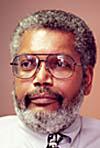The turbulent '90
The joint operating agreement between the Free Press and News combined circulation, advertising, business and production for both papers under a new company: Detroit Newspapers. The agency is co-owned by Knight Ridder, parent company of the Free Press, and Gannett, parent company of The Detroit News.
Under the JOA, the newspapers publish separately Monday through Friday. On weekends, the newspapers publish combined editions under the masthead "The Detroit News and Free Press". On Saturdays, the Free Press provides news, sports and business and the News provides features. On Sundays, those roles reverse. Holiday editions are also combined.
Although Gannett took the front of Sunday's paper and top billing in the joint name, Knight-Ridder took morning circulation for the Free Press. The Free Press had traditionally been Detroit's morning paper and the News, like many papers across the country, had been moving into the morning cycle to satisfy the changing tastes and schedules of newspaper readers. Having morning home delivery exclusively for itself, the Free Press soon became the larger newspaper. The JOA meant a big change for readers of the two newspapers, and for staffers. Combining parts from two of the largest newspapers in the country took time and was rocky. Profits continued to elude the newspapers, and so did euphoria that Free Press staffers had expected from a death-row reprieve.
 When Neal Shine was called out of retirement to become publisher, however, Free Press staffers cheered. Shine had started at the Free Press as a copy boy in the 1950s and was well known and loved inside the Free Press -- and out. He told Knight-Ridder executives that he wouldn't be much of a publisher because he didn't know the difference between a balance sheet and a bed sheet, but the choice proved to be an inspiration to the staff and helped rebuild goodwill in the community.
When Neal Shine was called out of retirement to become publisher, however, Free Press staffers cheered. Shine had started at the Free Press as a copy boy in the 1950s and was well known and loved inside the Free Press -- and out. He told Knight-Ridder executives that he wouldn't be much of a publisher because he didn't know the difference between a balance sheet and a bed sheet, but the choice proved to be an inspiration to the staff and helped rebuild goodwill in the community.
With spirits on the rise and black ink returning to those balance sheets, the Free Press was coming back.
Back-to-back Pulitzer Prizes for feature photography in 1989 and 1990 helped buoy staff morale.
Despite Shine's lack of knowledge about balance sheets, the Free Press broke even in 1991 and began to turn a profit in 1992.
It was not to last.
In some ways, the JOA had set the newspapers and unions on a collision course. Having dropped their opposition to the agreement, unions expected to share profits that had been vastly overestimated. Detroit Newspapers, however, said that staffing levels were far above those at other newspapers, and wanted buyouts.
On July 13, 1995, six Detroit newspaper unions with 2,500 members went out on strike.
The strike was costly for both sides. Readers and advertisers pulled out of the papers to support the strike or because they had been intimidated. Vandalism and violence split the community. The unions themselves suffered divisions as 450 workers -- most of them journalists -- decided to cross picket lines and go back to work.
 Shine, brought back to unify the Free Press, turned 65 and retired. He was succeeded as publisher by Heath J Meriwether. Meriwether had come to the Free Press as executive editor in 1987. Until detroit, he had spent his career at the Miami Herald, where he rose from intern, through the reporting ranks, to executive editor.
Shine, brought back to unify the Free Press, turned 65 and retired. He was succeeded as publisher by Heath J Meriwether. Meriwether had come to the Free Press as executive editor in 1987. Until detroit, he had spent his career at the Miami Herald, where he rose from intern, through the reporting ranks, to executive editor.
Bob McGruder, managing editor at the Free Press,  was promoted to succeed Meriwether as executive editor. McGruder had joined the Free Press in 1986 as deputy managing editor. He had come from the Cleveland Plain Dealer, where he had been managing editor since 1981. Like Meriwether, McGruder had a long history at his previous paper, working as a city hall reporter and city editor before becoming executive editor.
was promoted to succeed Meriwether as executive editor. McGruder had joined the Free Press in 1986 as deputy managing editor. He had come from the Cleveland Plain Dealer, where he had been managing editor since 1981. Like Meriwether, McGruder had a long history at his previous paper, working as a city hall reporter and city editor before becoming executive editor.
The newspapers never missed a day of publication during the strike -- but once had to use a helicopter to fly papers out of a blockaded printing plant.
In February, 1997, the unions made an unconditional offer to return.
Although striking workers wanted to come back immediately, they are being called back to honor guarantees won in previous contracts or as jobs become available.
There appear to be years of legal fights ahead for the newspapers and unions, and more contracts to negotiate in 1998. The papers had returned to profitability in late 1996, however, and are bringing back advertisers and trying to rebuild circulation.
The real struggle, however, will be the same battle that newspapers everywhere are fighting to reverse the trends in declining newspaper circulation and to use new technologies to extend their reach.
On July 26, 1998, completing one of the cost efficiencies brought on by the joint operating agreement, the Free Press moved to 600 W. Fort Street and began publishing out of newsrooms built in space that had been the Detroit News pressroom.
